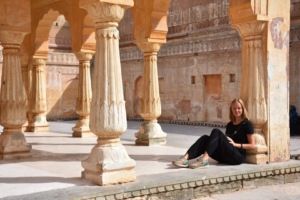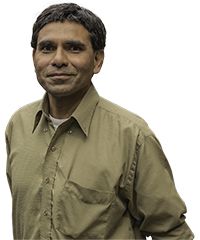Opinion
Mishra’s Mishmash: Love and election is in the air
Mrutyuanjai Mishra
This article is more than 6 years old.

Julie Raagaard in the land of yoga (photo: private photo)
The first half of 2019 holds one absolute certainty, and we don’t need the country’s prominent political pundits to confirm it: by June 17, Denmark will have held a general election.
And now speculation is in the springtime air that Lars Løkke Rasmussen – the prime minister, but for how much longer? – will announce the date imminently.
Once again, among the issues that will decide who leads the next coalition, and accordingly becomes PM, is immigration.
Was just a skinny lad
Denmark has a tradition of kick-starting the new year by listening to the speech of the PM, which is broadcast on the two major television channels.
This year, Rasmussen told the Danes that when he attended gymnasium in the early 1980s there were only 50,000 people of non-western origin living in Denmark.
Today in 2019 that figure has reached half a million. That figure is significant, as it sparks another debate: whether those immigrants of primarily Asian, Middle-Eastern and African background are well integrated into Danish society.
Even though Rasmussen and the present government, which won the last election on the agenda of being strict on immigration, would like the 2019 elections again to be decided on the issue of who is tough on controlling the borders, it is not entirely possible to make this year’s election a replica of the last one.
A new generation of Danes is solidifying who are open-minded and have travelled the world and formed their own opinions.
Radio go-go
One such new voter is Julie Raagaard, an international politics student at CBS, who caught the attention of Denmark a year ago when she called up one of Denmark’s most popular radio programs, ‘Mads og Monopolet’.
She asked a panel consisting of three public figures – politician Johanne Schmidt-Nielsen, comedian Thomas Warberg and radio host Simon Jul – if it was advisable for a young girl to travel alone to India.
Raagaard insisted she wanted to see the birthplace of yoga, which has now become a truly global phenomenon. All three guests on the program accepted her desire to travel alone, although they advised her not to go out alone after sunset.
Don’t stop them now
Raagaard went on to enjoy a successful trip. Her impression wasn’t blurred by the image created by the media that the entire country is unsafe for women – a claim that Politiken did its best to substantiate with a cartoon on March 8 depicting four Indian men anxious to visit Denmark because of its rape rate (see page 1).
When I met Raagaard on the university campus, she once again reiterated her desire to go to India and help the children there by teaching – and to travel to other states she has not yet visited as well.
Raagaard is among the many open-minded new voters who will be taking part this time around – a new generation of Danish voters who see the world not through the prism of western and non-western origin, but more by what is healthy and what is unhealthy. Yoga is healthy and Raagaard practises it, and now it is an inseparable part of her concept of a good life.

About
Mrutyuanjai Mishra
As a regular contributor to the Times of India, the country’s largest newspaper, Mishra is often sought-after by Danish media and academia to provide expertise on Asian-related matters, human rights issues and democratisation. He has spent half his life in India and the other half in Denmark and Sweden.










































